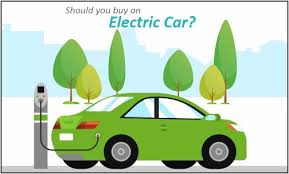With plenty of electrified options, are you thinking about leaving gas behind?
Electric cars used to be a novelty, but today you can choose from more than 40 pure battery-electric models — at least one model from nearly every major automaker. And with growing pressure on carmakers to build them, more electrified cars and trucks are introduced every year.
Traditional gas-powered cars still make up the majority of new-car sales, but more drivers are making the switch to electric vehicles. But is an EV the right choice for everybody?
Table of Contents
- Intro
- Is an EV Right for Me?
- Common Reasons for Going Electric
- Want to Know More?
Is an EV Right for Me?
How should shoppers decide if now’s a good time to buy an electric car? The issues to consider are pretty simple:

Can you charge an EV? If you own a single-family home, you can install a home charger. If you live in an apartment or condo, it’s a little more complicated. Some offer chargers already. If not, it’s worth asking the landlord if they’ll consider adding one. If that’s not an option, the next thing to consider is whether there’s a public charger nearby.
If you have convenient access to a charger, the next things to consider are your needs, budget, and environmental concerns. EVs do require resources to build, but once on the road they are far more friendly to the environment than vehicles that burn fossil fuels.
What are your daily needs? Is your daily commute under 150 miles? If so, and there’s a second vehicle in your family to use for longer trips, most modern EVs will have more than enough range to tackle your daily commute.
If the EV will be your only car, consider one with 250 or more miles of range to help cover unexpected trips. On even longer drives, most EVs can be charged at public fast chargers that provide up to 80% battery capacity in a short time. There are about 20 models available now, ranging from the 260-mile Hyundai Kona Electric small crossover, which starts just over $34,000, to the 516-mile Lucid Air Grand Touring, at $111,400.

Do you need to tow anything, like pull a large boat or trailer with your electric vehicle? EVs might not be the best option for this use, but many EVs are rated for towing. One example is the Rivian R1T electric pickup, which has an 11,000-pound tow capacity. That’s a hefty tow rating, but Rivian says towing a trailer of that size will cut the RT1’s range in half, so you would need to plan accordingly. It’s a similar story for the Ford F-150 Lightning, a battery-electric version of the best-selling F-150 pickup.
Finally, what is your budget? EVs typically cost a bit more than traditional gas-powered vehicles; but, they could save you in operating costs, so there are tradeoffs to be considered.
On the more affordable side, you’ll find smaller EVs like the five-passenger Nissan Leaf hatchback. It offers 152 miles of range and a price tag of just under $30,000 before incentives. On the opposite end of the spectrum is a vehicle like the four-passenger Porsche Taycan Turbo S Cross Turismo, a high-performance sport sedan with a base price over $200K and over 200 miles of range. Many of the high-performance and super-luxury EVs are too new for many used models to be available, but there are a decent number of mid-priced EVs now in the used market.
Common Reasons for Going Electric
There are several good reasons for buying an electric vehicle. Many buyers are drawn to the advanced technology and modern features showcased in EVs. The latest touchscreen controls are as easy to use as an Apple iPhone, so drivers immediately feel at home behind the wheel. Some of the newest EVs, such as the Volvo EX30 crossover, use Google’s built-in infotainment operating system, which is as familiar as a Google search bar.

Another popular reason to drive an EV is not having to stop for gas. Many EV owners find it convenient to charge their cars at home overnight, a time when many utility companies offer their lowest electricity rates. Using a public charger at your workplace or shopping area also allows drivers to power up without interrupting their busy schedules.
One word of caution — don’t buy an EV just because gasoline prices are high. Gas prices fluctuate and should not be the most important reason for deciding to go electric. You still have to pay for electricity to charge your EV, whether it’s a higher bill at home or payments at a public fast charger. Most of the time, the electricity needed costs less than what you might pay for gas, but it’s not always a huge savings and it may take a while to recoup the higher up-front cost of an EV.
That’s because the average fuel efficiency of all-new EVs is the equivalent of just under 100 mpg. At the typical cost of household electricity across the U.S. now, the power needed to equal the energy in a gallon of gas costs $5.05. But that’s $5.05 for 100 miles of travel. Internal combustion vehicles in today’s market average 30 mpg and can’t come close to an EV’s fuel price efficiency, even if gas prices dropped to $2.50 a gallon.
So fuel savings with an EV can be pretty big, but not enough to quickly make up the premium an EV buyer will pay on the MSRP.




